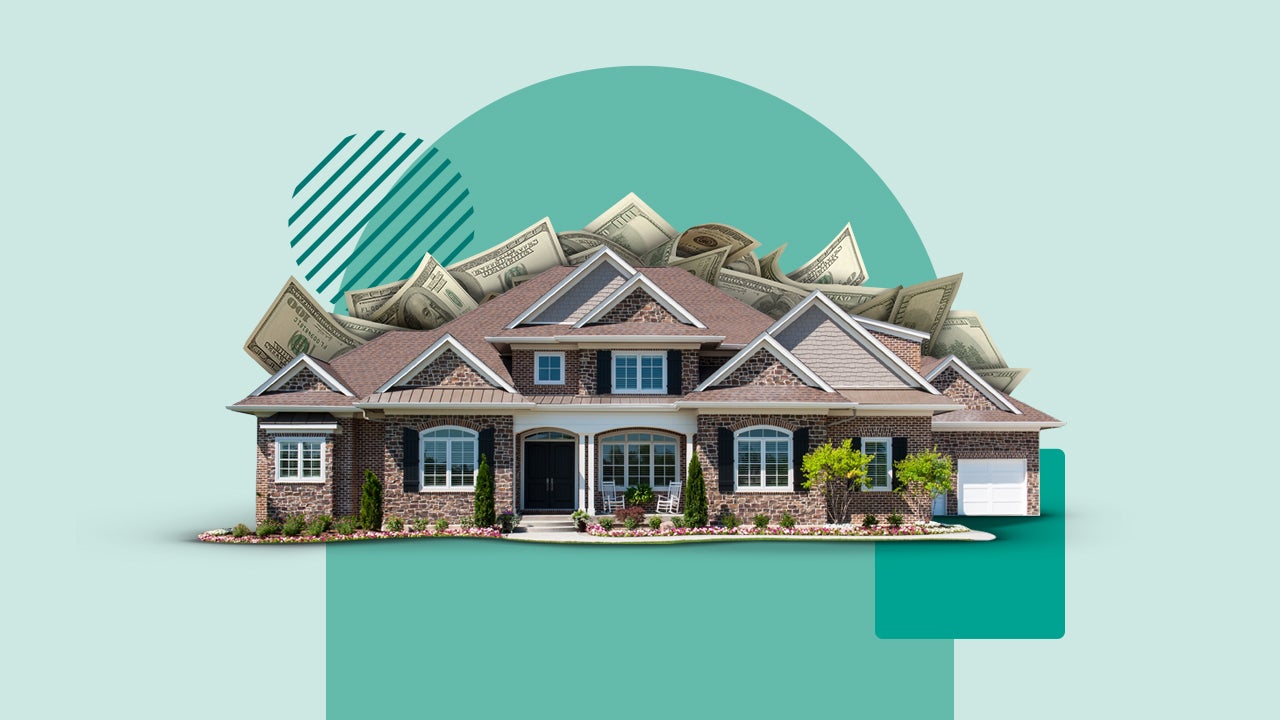What income do I need to afford an $800K house?

In just about any market in the country, those who can afford a homebuying budget of $800,000 are likely to find many enticing possibilities. The nationwide median sale price as of August 2023 was $407,100, per the National Association of Realtors, so this level of financial flexibility places you well above what most buyers pay. However, whether you can manage the financial burden of such a pricey purchase will depend on several factors, such as your earnings, how much down payment you can make and the interest rate on your mortgage loan.
Bankrate’s mortgage calculator can help you work out the income needed to afford an $800K house. Let’s assume you provide a 20 percent down payment ($160,000) on a 30-year fixed-rate loan with a 7.0 percent interest rate — that would make your monthly principal and interest payment $4,257. Additional expenses like property taxes, home insurance and homeowners association fees (if applicable) will increase this, so let’s bump up the total to about $4,800 per month. That equates to $57,600 spent on housing every year.
One frequently used guideline for housing affordability suggests that you shouldn’t spend more than 28 percent of your total income on housing-related expenses. The $57,600 figure above is about 28 percent of $207,000, so that would be around the income you’d need for an $800K house purchase. (Remember, though, that this calculation doesn’t include the upfront money required for a down payment and closing costs, or the expense of ongoing maintenance and upkeep.)
Income to afford an $800K house
Experts often recommend that house-hunters (and renters, for that matter) follow the 28/36 rule of home affordability. This rule of thumb states that you should spend a maximum of 28 percent of your income on housing expenses and no more than 36 percent of your income on all your debt payments combined (including housing).
Let’s apply the 28/36 rule to an income of $207,000. These yearly earnings translate to about $17,250 each month, and 28 percent of that is $4,830. Ideally, this is the most you should allocate for your monthly mortgage payment, including principal, interest, property taxes, insurance and, if applicable, HOA fees. That’s right on par with our above estimation of $4,800 per month, inclusive of principal, interest, property taxes, insurance premiums and HOA fees.
You also need to consider the 36 percent part. Add up your monthly debt payments, including not just your mortgage expenses but also things like car payments, credit card bills and student loans. Does this total exceed 36 percent? Your budget is high, but it’s still important not to strain it.
Keep in mind that the $4,800 doesn’t include ongoing homeownership expenses like utilities, maintenance and repairs. These costs depend on your property’s size, type and location.
Where to look for an $800,000 home
With an $800,000 budget, you’ll have wide choices in most markets. But keep in mind that any amount of money can go further in some places than others. For example, $800,000 might buy a spacious home on a lot of land in most areas, but only a modest condo in an expensive city like New York or San Francisco. Hawaii and California both have median prices of around $800K, according to recent Redfin data, as do desirable cities like Boston ($760,000) and Seattle ($810,000).
What factors determine how much you can afford?
How much you earn and the price of the home you want are obviously crucial, but when you’re gearing up to buy a house, there’s more to consider than just those two things. All of the following factors will impact how much house you can afford:
- Down payment: The money you pay upfront when buying a home directly affects how much you’ll pay each month for your home loan. The more you pay initially, the less you’ll need to borrow, leading to lower interest costs over the loan’s duration.
- Mortgage type: Different mortgage types have different minimum requirements. It’s often recommended to make a 20 percent down payment, but for an $800,000 home, that translates to a substantial $160,000. You can keep your upfront costs down by making a lower down payment — many loans require only as little as 3 or 3.5 percent. However, doing so will increase your monthly payments over the life of the loan, and may also require you to pay for private mortgage insurance.
- Loan-to-value and debt-to-income ratios: Mortgage lenders will closely examine your loan-to-value (LTV) ratio, which measures the loan amount versus the home’s value, and your debt-to-income (DTI) ratio, which measures your total monthly debt payments versus your monthly income. “The maximum DTI ratio many lenders will allow is 43 percent,” says Roseanna West, vice president of mortgage origination for Members Choice Mortgage in Houston. “That means you want the total of your new monthly mortgage payment, including taxes and insurance, plus all other monthly payments you are obligated to make on things like installment loans and credit cards, to be equal to or less than 43 percent of your gross monthly pre-tax income.”
- Credit score: The mortgage type and interest rate you qualify for will depend heavily on your credit score. A higher score helps you secure a lower rate, potentially saving you thousands throughout the loan term. Different loans will require different minimum scores.
- Financial assistance programs: Many local and state programs exist to offer homebuyers down payment and closing cost assistance. Your high income might make you ineligible, but it’s worth looking, especially if you’re buying in an expensive market where $800,000 doesn’t go as far as you’d think. Your real estate agent can help you figure out what programs you might qualify for.
Stay the course until you actually close
Don’t let your attention lapse while you’re waiting for closing day to roll around. It’s not a done deal until you have the keys in your hand at the end, so until then, be vigilant about paying your bills on time, keeping your bank balances consistent and keeping your credit score up. Don’t do anything that might affect your creditworthiness, like buying a car, applying for a new credit card, or even switching jobs if you can help it — don’t give the lender any reason to reconsider your application. And stay in regular contact with your real estate agent, too. Agents do this for a living: They can answer your questions, keep the process moving smoothly and get you to the finish line successfully.
FAQs
-
Ideally, you should make $208,000 or more a year to comfortably manage an $800,000 home purchase, based on the commonly used 28 percent rule (which states that you shouldn’t spend more than 28 percent of your income on housing). But a $200,000 annual income may be sufficient depending on your loan amount and interest rate — if you’ve put down more than 20 percent upfront, for example, your monthly payments would be lower because you’re borrowing less.
-
Assuming you make a 20 percent down payment on a 30-year fixed loan with a 7.0 percent interest rate, Bankrate’s mortgage calculator shows that your monthly principal and interest payment will be $4,257. You’ll have to add the extra expenses that vary depending on your location, like property taxes, home insurance premiums and homeowners association fees (if applicable), to that figure to determine your exact monthly cost.
Why we ask for feedback Your feedback helps us improve our content and services. It takes less than a minute to complete.
Your responses are anonymous and will only be used for improving our website.






